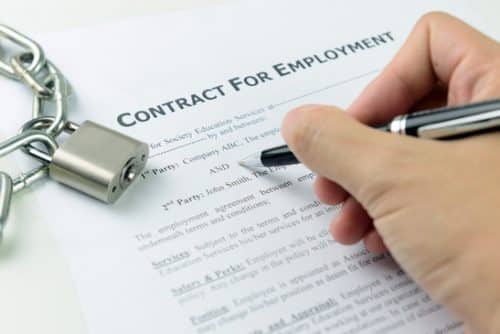In the event of difficulty, employment lawyers can assist employers and employees in working together to find a solution. If your employer-employee relationship becomes strained due to a dispute over wages, workplace safety, discrimination, or wrongful termination, knowing an employment lawyer who can explain both sides’ rights and duties is beneficial. Discover more about an employment lawyer, their job description, salary, and how to become one.
What are Employment Lawyers?
Employment lawyers represent both employees and employers in matters concerning state and federal employment law. Employment lawyers ensure that all employees are treated fairly and consistently and that employers comply with all of the numerous local, state, and federal laws that apply in today’s workplace.
Employee handbooks can be drafted and reviewed by employment lawyers, who can also aid with wage law issues and represent employees or employers before the Equal Employment Opportunity Commission (EEOC). They also advise employees on their rights if they believe their rights have been infringed.
Employment lawyers deal with employment-related legal matters such as:
- Termination without cause;
- Discrimination at work;
- Sexual assault;
- Contract infringements;
- Employee benefits issues, such as health insurance and retirement savings schemes; and
- Protection for whistleblowers.
Many lawyers defend employees who are not members of a union and are effectively powerless in cases where employers have treated them in ways that violate applicable law and disfavor employees.
When Should I Consult an Employment Lawyer as an Employee?
Employers can engage in a wide range of illegal practices that disfavor employees or breach their rights. If you are in any of the following situations, you should contact an employment attorney:
- The individual has been harassed at work;
- The person has been treated unfairly because of a protected characteristic, such as pregnancy;
- The employer has retaliated against the employee because they exercised a legal right, such as requesting overtime pay;
- The person’s employment was terminated in violation of an express or implied employment contract;
- The individual is coerced into signing an agreement in which they waive their legal rights.
- The employee’s employer has failed to provide them with the benefits to which they are entitled under their employment contract.
If an employee is injured or becomes ill at work, they may be required to file a workers’ compensation claim. An employment lawyer can assist an employee in filing the most effective claim possible or in appealing a denial of benefits.
If an employee works in a non-unionized job and wishes to unionize, the employee should speak with an employment lawyer. An employment lawyer can assist by informing employees of their right to organize a union and the activities that can be undertaken in connection with that effort. Employees can be informed of their rights, such as the right to be free of discrimination based on protected union activity.
Read Also: Disgruntled Employee: Handling a Disgruntled Employee
Of course, an employment lawyer can also advise employers on their rights and responsibilities in relation to union workers and employee attempts to unionize in an employer’s workplace.
As soon as an employee becomes aware of a problem, they should contact an employment attorney. If a person waits too long to contact an attorney, they may be unable to prove the employer’s wrongdoing and thus recover damages. Furthermore, there are usually time limits for asserting legal rights and filing complaints; any delay risks losing the right to file a claim or complaint.
When Should I Hire an Employment lawyer as an Employer?
An experienced employment attorney can assist a company with a wide range of employment-related difficulties. Many employment lawyers can educate employers on the state and federal regulations that apply in their specific workplace. Of course, an employment lawyer can assist employers in ensuring that they are in compliance with the applicable legislation.
Employment lawyers can also assist employers in learning about their obligations under the Occupational Health and Safety Administration’s (OSHA) rules as well as environmental legislation. Furthermore, employment lawyers can represent employers in front of a variety of governmental boards and authorities if they are cited for noncompliance.
- If an employer encounters any of the following situations, he or she should consult with an employment attorney:
- They require representation in collective bargaining with a union.
- An employee has filed a discrimination or harassment complaint against them;
- When an employee files a lawsuit in which they are named as a defendant in an employment-related dispute; or
- The employer intends to lay off or fire a substantial number of employees, discontinue an employee benefit, or alter the current pension plan that it provides.
Other than employee-employer disputes, a qualified employment attorney can help you with a variety of legal difficulties. An employment lawyer can assist you in reviewing or preparing contracts and agreements that you use with your employees, such as employment contracts, severance agreements, or releases.
Of course, workplaces are subject to a variety of regulations imposed by a variety of municipal, state, and federal agencies, such as OSHA. Of course, an employer would want to maintain regular touch with an attorney who is knowledgeable with the regulatory areas that apply to the employer’s specific workplace. The employer would like the attorney to regularly check their compliance with applicable regulations.
Read Also: WORKERS COMPENSATION: Benefits, Process & Claims in UK
How Much Does an Employment Lawyer Charge?
The cost of local employment lawyers can vary significantly depending on a number of criteria including the lawyer’s expertise, the area of law at stake in the situation, and the specifics of a person’s individual case. In general, attorneys bill their clients using one of three fee schedules: hourly rates, flat fees, or contingent fees. They are as follows:
#1. Hourly rate:
Most attorneys charge an hourly rate for employment cases. The median attorney hourly cost in California begins at $350 for smaller, less experienced companies and $450 for bigger, more experienced firms.
#2. Contingency fee:
In a contingency fee agreement, attorneys charge their clients a portion of any award of damages that the attorney obtains on their behalf if their case is successful. In general, attorneys will be paid a predetermined percentage based on the stage at which they win an award, whether before or after a trial.
#3. Flat Fee:
For less complicated legal issues such as simple wills, uncontested divorces, powers of attorney, or even minor criminal cases, attorneys may charge a flat fee.
What Are Some of the Most Common Issues When Hiring an Employment Lawyer?
When considering hiring an attorney, it is prudent for a consumer to take a few precautions. Before hiring a lawyer, it is a good idea to consult with several of them who specialize in the area of expertise that the individual requires. But first, find out if the attorney charges for an initial consultation. If so, on what basis (hourly, flat fee, or otherwise) and how much. In most cases, a person will feel most at ease with one of the attorneys they interview and will prefer to hire that attorney.
Before meeting with a lawyer, a person should prepare a brief, concise summary of their problem. A person should inquire about the lawyers’ experience with the exact type of problem that they have, their fees, what their options may be, their chances of success, who will work on their case (whether the attorney or an associate), and when the problem might be handled.
Why Should I Hire an Employment Lawyer?
If you are involved in an employment-related dispute or need to ensure that you are in compliance with the many local, state, or federal employment regulations, you should seek the advice of a local employment law attorney.
Depending on the nature of the situation, your lawyer can assist you in ensuring that you are fully compliant with all applicable requirements. They can even represent you in a lawsuit against your current or former employer, if necessary.
What Is the Role of an Employment Lawyer?
Employment lawyers offer a wide range of services to both employees and employers. Some of the most common duties that lawyers in this practice area assist with are as follows:
#1. Rights Explanation
An employment lawyer can assist the client in understanding his or her rights. This includes outlining the applicable laws in the situation as well as the client’s alternatives, which may include lawsuits, mediation, negotiation, or other activities. A lawyer may also explain the advantages and disadvantages of each choice and advise on the best way to proceed with a lawsuit.
#2. Compliance
One typical responsibility for employment lawyers who represent the employer is to assist employers in remaining compliant with various laws. This includes adhering to federal and state anti-discrimination laws, as well as developing policies and notifying employers and management that do not discriminate on the basis of race, color, gender, age, color, national origin, religion, or handicap. Employers may also benefit from the assistance of employment lawyers in learning about their obligations in terms of adhering to OSHA rules and environmental legislation. Furthermore, employment lawyers represent employers before governmental boards and authorities.
#3. Complaint Filing
Before an employee can pursue a private cause of action in most employment law matters, a claim must normally be filed with the Equal Employment Opportunity Commission or another governmental agency. An employment lawyer can assist an employee in filing a complaint with the appropriate agency and explaining the time limit in which the claim must be made, as well as other aspects of the claim.
#4. Litigation
Employment lawyers can also help with employment-related lawsuits. They represent employees who are suing their employer for discrimination, wrongful termination, denied benefits, or wage and hour violations. They also represent employers in similar cases. Employers may file lawsuits against employees who they believe have broken non-compete or confidentiality agreements. Employment lawyers can help with the following legal claims:
Lawsuits Regarding Wage and Hour
Wage and hour claims arise when an employee is not paid the wages to which he or she is entitled. An employer may request that the employee work off the clock or the employee may not be paid for overtime. These types of claims can also emerge when employees are misclassified in order to avoid paying employees overtime rates.
#5. Lawsuits for Employment Discrimination
When an employee is terminated, demoted, reassigned, not hired, or otherwise subjected to adverse employment action based on a protected status, an employment discrimination case may be filed. Title VII of the Civil Rights Act of 1964 forbids discrimination based on race, color, national origin, gender, or religion. The Age Discrimination Act forbids discrimination against employees over the age of 40, whereas the Americans with Disabilities Act prohibits employment discrimination based on disability.
Each of these laws requires a distinct procedure to be followed, as well as different employers to whom the legislation applies. Some laws, for example, apply to employers with 15 or more employees, whereas others apply to employers with 20 or more employees. There may be additional state legislation that protects employees when there are fewer employees. In addition to the rights afforded by federal law, state legislation may provide additional protections for other types of employees.
#6. Class Actions in the employment
When a large number of employees are similarly harmed by an employer’s unfavorable conduct, such as discrimination or a wage and hour claim, the employees may band together to file a class-action lawsuit against the firm. This arrangement involves a number of litigants. The benefit for the employees is that the cost of litigation can be shared among the party members.
#7. Claims for Workers’ Compensation
Workers’ compensation claims emerge when an employee is hurt or falls ill as a result of his or her work. An employment lawyer can help an employee file a claim or appeal. He or she may also represent the employer’s interests and assist in the verification of a denial.
#8. Third-Party Litigation
In rare situations, an employee may be able to file a third-party lawsuit against someone other than his or her employer for a work-related injury. Employment lawyers assist clients in preparing complaints, communicating with the other party’s legal representation, and appearing in court on their behalf.
#9. Union Concerns
Employment lawyers can advise employees on their right to organize a union as well as other rights, such as the right to be free of discrimination based on protected union activities. They may also advise employers on their rights and obligations in dealing with unionized employees.
Read Also: LAWYER FOR WORKERS’ COMPENSATION: When Do You Need One
How to Become a Labor and Employment Lawyer
While everyone’s legal path will be unique based on their personal experiences, there are a few fundamental steps you can take to become an employment lawyer. In eight steps, you can become an employment lawyer:
#1. Get your Bachelor’s degree
Earning an undergraduate degree in the discipline of your choice is the first step toward becoming an employment lawyer. When applying to law school, you must have a bachelor’s degree as a minimum. While there is no mandatory major or path for undergraduates with law school aspirations, it may be advantageous to select a major that will help you expand your legal knowledge.
Furthermore, as an undergraduate student, you should look for extracurricular opportunities such as internships or fellowships that will provide you with legal experience. Such opportunities can be found at law firms, legal clinics, and government offices. This kind of experience can help you stand out while applying to law school in your senior year of college.
#2. Sit for the LSAT
You will need to apply to law school during your final year of college. The Law School Admission Test (LSAT), which is given four times a year in June, September, December, and February, is the initial step in applying to law school. Because you must submit your applications in the fall of your last year to be considered for admission the following school year, you might consider taking the LSAT in June before your final year or in September to qualify.
It is critical to study diligently in preparing for the LSAT. When admissions committees analyze your application materials, your test result will be a vital signal of your competency. In reality, several schools state unequivocally what minimal score they will accept from candidates. As a result, prior to taking the test, you should create score-related goals to ensure you have the possibility of attending your preferred institution.
Furthermore, many law school applicants enroll in LSAT-specific test preparation classes or create study groups with peers to assure they will perform well on the exam. There are numerous test preparation products and processes available to assist law school applicants in achieving a high score. If you do not meet your target score on your first attempt, you can repeat the LSAT to improve your score.
#3. Submit an application to law school
After taking the LSAT and meeting your target score, you should assemble your application papers and register with the Credential Assembly Service (CAS). CAS is used for application procedures at nearly all law schools. You may need to gather the following materials to complete your applications:
- Recommendation letters
- Statement of purpose
- Addendum
- Transcript
- LSAT results
- Curriculum vitae or resume (CV)
- International candidates must pass an English proficiency exam.
Once you’ve gathered these materials, you can upload them to the CAS and apply to the schools you’ve chosen. Applying to numerous institutions at once is usually a good idea because it increases your chances of acceptance. Before submitting applications, make sure you’ve chosen institutions that provide programs that will help you realize your goal of becoming an employment lawyer. You should also examine key criteria such as cost and school location, which can help you narrow down your options overall.
#4. Take your objectives seriously.
Once admitted as a law student and accept an offer, you should devise a strategy to make the most of your time in school. Law school normally lasts three years, and during that time, you will have numerous opportunities to expand your portfolio of skills and expertise. Law school is a specialized professional opportunity that will prepare you for a certain career. As a result, you should create goals and take them seriously—for example, to become a top student, you can join a study group, excel on tests, and seek opportunities to obtain real-world experience.
During your first year, you will most likely take core coursework to assist you to establish the foundational knowledge that all lawyers require. You will have the opportunity to take specialized elective subjects during your second and third years that will help you enhance your knowledge set around specific law fields, such as employment law. Also, you could look into taking classes that cover a variety of job-related topics.
You will have the chance to take the Multistate Professional Responsibility Examination (MPRE) in your third year of law school, which is required for practically all practicing lawyers. It is advisable to take the MPRE during your third year so that you may concentrate on studying for the bar test following graduation.
#5. Expand your professional network and resume
While in law school, you should concentrate on developing a network of legal colleagues, teachers, and peers who can assist you in integrating into the legal industry. Whatever form of law they practice, such contacts may be useful in the future when looking for specialist co-counsel or legal work prospects.
Furthermore, as a law student, you should actively seek out opportunities to gain practical experience in the field of employment law. You can get involved in employment law by joining student clubs, professional associations, and law publications.
Furthermore, it is critical to seek out real experiences such as internships that allow you to work alongside a professional lawyer or judge. Not only do these internships typically provide the opportunity to receive course credit, but they also provide the opportunity to work firsthand in the legal sector. This type of work is also available in law clinics, judicial clerkships, and practical courses. Such opportunities will help you strengthen your résumé, broaden your network, and sharpen your talents. In certain cases, these experiences may even lead to employment prospects after graduation.
#6. Completed law school
You will be eligible to finish law school after three years of study, internships, and networking. Many law students attempt to find work prospects prior to graduation in order to have an instant career set up. While this is a top objective for many law students, many work opportunities you can get before leaving law school will be reliant on passing the bar exam, which will allow you to practice in your state. As a result, as you approach graduation and beyond, it’s equally critical to focus on studying diligently for the bar exam.
#7. Clear the bar exam
As previously indicated, passing the bar test is a necessary step toward becoming an employment lawyer. The two to three-day exam will assess your eligibility to practice law in your state, regardless of specialty. Similar to the LSAT, you may want to think about attending test preparation courses or joining a study group to prepare for the bar exam.
Between graduation and the date of their test, many candidates study full-time. It’s crucial to understand that many people who take the bar exam fail on their first try. As a result, you may retake the exam in the hopes of becoming a licensed lawyer.
#8. Look for a chance to practice labor and employment law.
After passing the bar exam, you will be authorized to practice law in your state. If you didn’t get a job before graduation, you should look for possibilities to practice employment law from here. While there are numerous strategies that might assist you in finding work, try to make use of the services that your alma mater provides to recent graduates.
You can look for career chances by joining a professional organization that may have specific job ads for members. Furthermore, law schools frequently collaborate with local law firms to offer on-campus interviews for recently graduated students, which might provide you with the opportunity to meet with possible employers. If none of these techniques work, you may always look for a job online or conduct informational interviews at local businesses to have a better grasp of the current job market.
Employment Lawyer Education Requirements
A Juris Doctorate is required for employment lawyers. It is advantageous, and in certain cases required by employers, to have a diploma from an American Bar Association-accredited law school. In addition, they must maintain a valid attorney’s license in that state.
Employment lawyers must have one or more years of experience practicing law, primarily employment law, in order to be considered as a candidate for hire. When most employers require it for admission, it is tough to gain employment legal experience. Working in human resources or personnel departments, on the other hand, may boost a lawyer’s initial employability.
What Skills does an Employment Lawyer need?
To be successful in their business, employment lawyers must have a wide range of specific skills as well as a solid foundation of knowledge. Here are a few examples of skills you might want to work on while you pursue a career as an employment lawyer:
- Communication skills
- Analytical skills
- Research skills
- Creativity
- Judgment
- Persistence
- Flexibility
- Personal accountability
- Time administration
- Competence in business
What is the Average Salary of an Employment Lawyer?
Salary ranges for an employment lawyer might vary depending on region, position, and other situational circumstances. Despite this, the national average salary for an employment lawyer is $118,948 per year, with benefits such as health insurance and paid time off. While some employment lawyer earns more than others, this statistic represents the national average salary. Furthermore, the United States Bureau of Labor Statistics (BLS) predicts that the employment of lawyers will stay consistent over the next ten years, with a 4% rise in job opportunities.
Prospects for a Career as an Employment Lawyer
Employment lawyers can choose from a variety of employment opportunities. They can work for private law firms or practice on their own. They may also work in the legal departments of for-profit and non-profit enterprises. Some may even work in public interest organizations that provide legal assistance to employees.
Because of the complexities of labor laws in use in the United States, employment lawyers have relatively stable work prospects. Budget constraints, on the other hand, may limit the number of new hires. The bulk of job openings result from the replacement of former employment lawyers who retire, resign, or transfer. Employment lawyers frequently change legal firms in order to grow in their careers, whether through more income, more status, or different job responsibilities.
What is the process for hiring an employment lawyer?
Hiring an employment lawyer can be a big decision, but it doesn’t have to be a difficult process. Start by doing some research to find a few lawyers who have experience in your specific type of case. Schedule a consultation with each of them to discuss the details of your situation and see if you feel comfortable working with them. From there, you can make a decision on who you’d like to hire to represent you.
How much does it cost to hire an employment lawyer?
The cost of hiring an employment lawyer varies depending on the specifics of your case, the experience of the lawyer, and where you live. Some employment lawyers charge an hourly rate, while others may charge a flat fee or a contingency fee (a percentage of any settlement or award). Before hiring a lawyer, make sure you understand their fee structure and any potential costs involved.
What is the average settlement for an employment law case?
There is no one-size-fits-all answer to this question, as the settlement amount for an employment law case can vary greatly depending on the specifics of the case. Some cases may result in a settlement for just a few thousand dollars, while others may result in a settlement for several hundred thousand dollars or more. It all depends on the facts of your case and the outcome you’re seeking.
How long does it take to resolve an employment law case?
The timeline for resolving an employment law case can vary greatly depending on the specifics of the case. Some cases may be resolved quickly, within a few weeks or months, while others may take several years to resolve. The timeline can be impacted by factors such as the complexity of the case, the willingness of the parties to settle, and the speed of the court system.
What is the statute of limitations for filing an employment law claim?
The statute of limitations for filing an employment law claim varies depending on the type of claim and the jurisdiction in which it is filed. In general, it’s best to speak with an employment lawyer as soon as possible after an issue arises to determine the relevant statute of limitations and ensure your rights are protected.
Employment Lawyer FAQs
Should I hire an employment lawyer?
If an employer requires representation in collective bargaining negotiations with a union, they should call an employment attorney. An employee has filed a discrimination or harassment complaint against them; When an employee files a lawsuit in which they are named as a defendant in an employment-related problem;
What does an employment lawyer cover?
Employment law is a branch of law that deals with the rights, obligations, and responsibilities that arise from the employer-employee relationship, ranging from salaries and workplace safety to discrimination and wrongful termination. Employment lawyers often represent either employers or employees, but seldom both.
How much does an employment lawyer cost?
Because employment discrimination lawsuits can be difficult to establish, some employment attorneys charge by the hour. It could range between $100 to $600 per hour, depending on the attorney’s hourly charge. Court charges and other expenses will be added on top of this.
- Racism in the Workplace: How to Deal with Racial Discrimination at Work
- LAWYER SALARY: Average Salaries By State, Experience & Field of Practice (Updated!)
- How Much Do Lawyers Make: Lawyer wages in The US
- CONTRACT LAWYER: What You Need To Know About a Contract Lawyer
- Personal Injury Lawyer: Why You Need a PI Attorney







1 comment
Vielen Dank für die Übersicht und die Zusammenfassung, wann man einen Anwalt für Arbeitsrecht beauftragen sollte. Ich musste dies leider in der Vergangenheit auch schon. Kann es aber nur empfehlen, wenn man bei der Arbeit belästigt wird.